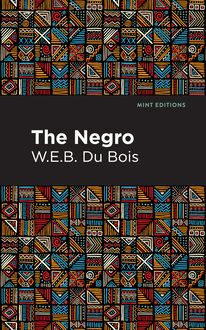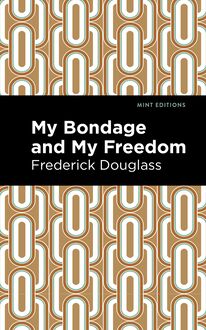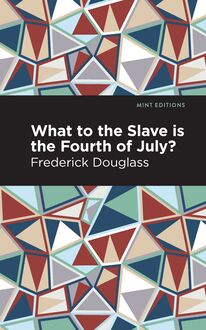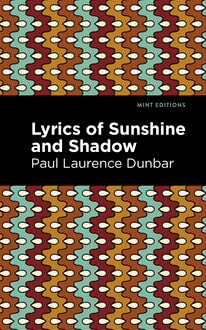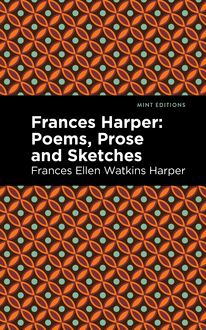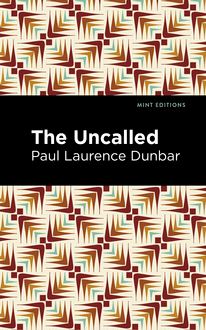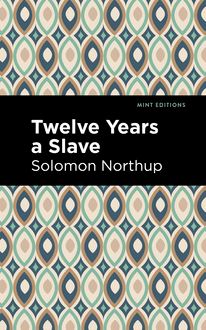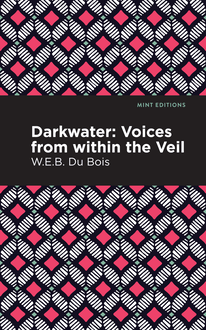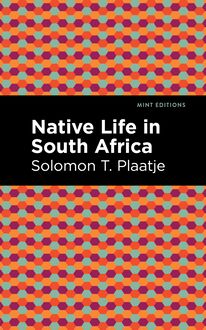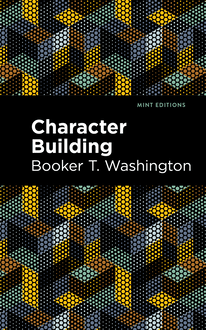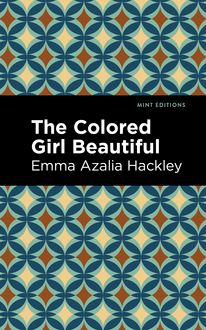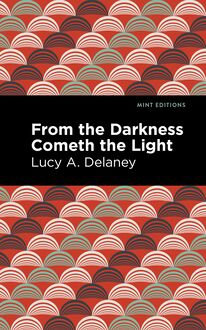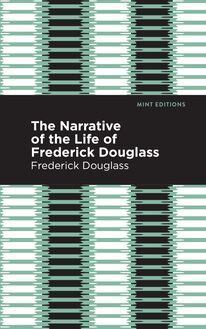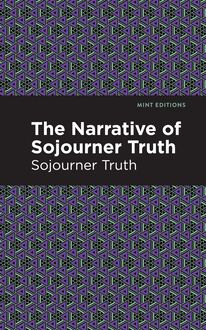-
 Univers
Univers
-
 Ebooks
Ebooks
-
 Livres audio
Livres audio
-
 Presse
Presse
-
 Podcasts
Podcasts
-
 BD
BD
-
 Documents
Documents
-
- Cours
- Révisions
- Ressources pédagogiques
- Sciences de l’éducation
- Manuels scolaires
- Langues
- Travaux de classe
- Annales de BEP
- Etudes supérieures
- Maternelle et primaire
- Fiches de lecture
- Orientation scolaire
- Méthodologie
- Corrigés de devoir
- Annales d’examens et concours
- Annales du bac
- Annales du brevet
- Rapports de stage
La lecture à portée de main
Vous pourrez modifier la taille du texte de cet ouvrage
Découvre YouScribe en t'inscrivant gratuitement
Je m'inscrisDécouvre YouScribe en t'inscrivant gratuitement
Je m'inscrisEn savoir plus
Vous pourrez modifier la taille du texte de cet ouvrage
En savoir plus

Description
America and Other Poems (1853) is a book of poems by J.M. Whitfield. Published while the poet was working as a barber in Buffalo, New York, America and Other Poems captures his sense of poetic form while expressing his belief in the abolition of slavery. In these odes, hymns, and prayers, Whitfield established his reputation as a pioneering African American poet, an impassioned voice for his people who tirelessly sought to change the course of history with his words. “The North Star,” which concludes the collection, was written for Frederick Douglass’ abolitionist newspaper The North Star, that “guard of truth and liberty” for all. “The writer of the following pages is a poor colored man of this city, engaged in the humble, yet honorable and useful occupation of a barber.” In the introduction to his debut book of poems, J.M. Whitfield proudly and directly asserts his identity. Although he does not fit in with the traditional figure of the poet, Whitfield proves his mastery of form while condemning slavery in the strongest terms. “America” opens the collection with a direct address to the nation “from whence has issued many a band / To tear the black man from his soil, / And force him here to delve and toil”: “America, it is to thee, / Thou boasted land of liberty,— / It is to thee I raise my song, / Thou land of blood, and crime, and wrong.” Without fear, Whitfield questions the moral and political promise of a nation built by slaves. He demands through song and prayer the advent of a day when to “north and south, and east and west, / The wrongs we bear shall be redressed.” With a beautifully designed cover and professionally typeset manuscript, this edition of J.M Whitfield’s America and Other Poems is a classic of African American literature reimagined for modern readers.
Sujets
Informations
| Publié par | Mint Editions |
| Date de parution | 21 mai 2021 |
| Nombre de lectures | 0 |
| EAN13 | 9781513287621 |
| Langue | English |
| Poids de l'ouvrage | 1 Mo |
Informations légales : prix de location à la page 0,0300€. Cette information est donnée uniquement à titre indicatif conformément à la législation en vigueur.
Extrait
America and Other Poems
J.M. Whitfield
America and Other Poems was first published in 1853.
This edition published by Mint Editions 2021.
ISBN 9781513282602 | E-ISBN 9781513287621
Published by Mint Editions ®
minteditionbooks.com
Publishing Director: Jennifer Newens
Design & Production: Rachel Lopez Metzger
Project Manager: Micaela Clark
Typesetting: Westchester Publishing Services
To
Martin R. Delany, M.D.
This volume is inscribed as a small tribute of respect,
For his character,
Admiration of his talents, and love of his principles,
By the author
C ONTENTS D EDICATION I NTRODUCTION A MERICA C HRISTMAS H YMN L INES ON THE D EATH OF J . Q UINCY A DAMS T O C LINQUE N EW Y EAR’S H YMN T O A . H . L OVE H OW L ONG T HE A RCH A POSTATE T HE M ISANTHROPIST A H YMN Y ES! S TRIKE A GAIN T HAT S OUNDING S TRING T O— P RAYER OF THE O PPRESSED T O S . A . T . D ELUSIVE H OPE T O M . E . A A H YMN S ELF- R ELIANCE O DE FOR THE F OURTH OF J ULY M IDNIGHT M USING O DE TO M USIC S TANZAS FOR THE F IRST OF A UGUST T HE N ORTH S TAR
I NTRODUCTION
“Another book of poetry,” exclaims the reader; “and that, too, by one of the proscribed race, whose lot has been ignorance and servitude.” It is even so: and this little volume is presented to the public in the full confidence that it will be read and appreciated, when the circumstances of its origin are known. Its merits as a literary production, we leave to be decided upon by the kind judgment of the American people. We do not claim that the poetry is of the highest order: but we do claim that it would be creditable to authors of greater pretensions than the humble colored man, who hath wrought it out amid the daily and incessant toil necessary for the maintenance of a family, who are dependent upon the labor of his hands for support. There is in it the fire of a genius which, under more favored circumstances, would have soared high, obtained no mean place in the world’s estimation. There is the voice of true poesy speaking in it, which, though in the rough it may be, and wanting the polish which education and refined opportunity give, yet nature outgusheth in harmonious numbers, and her bard, all untutored as he is, singeth sweetly, and giveth forth the conceptions of his soul in “words that breathe and thoughts that burn.”
The writer of the following pages is a poor colored man of this city, engaged in the humble, yet honorable and useful occupation of a barber. His time is constantly taken up in his business, and he writes in such intervals of leisure as he is able to realize. He is uneducated; not entirely, but substantially; his genius is native and uncultivated, and yet his verse possesses much of the finish of experienced authorship; there is the “ring of the true metal” in it. He feels the “Divine spark” within him, and longs for the means and opportunity to call in the aid of intellectual culture, that he may be enabled to give it form and shape, and clothe it in befitting language. This volume is presented to the public with this view, and in the hope that it may find a favorable reception with our people, and “put money in the purse” of the writer, that he may be able to cultivate, improve, and fully develop the talent which God hath given him.
B UFFALO , M AY , 1853
A MERICA
America, it is to thee,
Thou boasted land of liberty,—
It is to thee I raise my song,
Thou land of blood, and crime, and wrong.
It is to thee, my native land,
From whence has issued many a band
To tear the black man from his soil,
And force him here to delve and toil;
Chained on your blood-bemoistened sod,
Cringing beneath a tyrant’s rod,
Stripped of those rights which Nature’s God
Bequeathed to all the human race,
Bound to a petty tyrant’s nod,
Because he wears a paler face.
Was it for this, that freedom’s fires
Were kindled by your patriot sires?
Was it for this, they shed their blood,
On hill and plain, on field and flood?
Was it for this, that wealth and life
Were staked upon that desperate strife,
Which drenched this land for seven long years
With blood of men, and women’s tears?
When black and white fought side by side,
Upon the well-contested field,—
Turned back the fierce opposing tide,
And made the proud invader yield—
When, wounded, side by side they lay,
And heard with joy the proud hurrah
From their victorious comrades say
That they had waged successful war,
The thought ne’er entered in their brains
That they endured those toils and pains,
To forge fresh fetters, heavier chains
For their own children, in whose veins
Should flow that patriotic blood,
So freely shed on field and flood.
Oh no; they fought, as they believed,
For the inherent rights of man;
But mark, how they have been deceived
By slavery’s accursed plan.
They never thought, when thus they shed
Their heart’s best blood, in freedom’s cause
That their own sons would live in dread,
Under unjust, oppressive laws:
That those who quietly enjoyed
The rights for which they fought and fell,
Could be the framers of a code,
That would disgrace the fiends of hell!
Could they have looked, with prophet’s ken,
Down to the present evil time,
Seen free-born men, uncharged with crime,
Consigned unto a slaver’s pen,—
Or thrust into a prison cell,
With thieves and murderers to dwell—
While that same flag whose stripes and stars
Had been their guide through freedom’s wars
As proudly waved above the pen
Of dealers in the souls of men!
Or could the shades of all the dead,
Who fell beneath that starry flag,
Visit the scenes where they once bled,
On hill and plain, on vale and crag,
By peaceful brook, or ocean’s strand,
By inland lake, or dark green wood,
Where’er the soil of this wide land
Was moistened by their patriot blood,—
And then survey the country o’er,
From north to south, from east to west,
And hear the agonizing cry
Ascending up to God on high,
From western wilds to ocean’s shore,
The fervent prayer of the oppressed;
The cry of helpless infancy
Torn from the parent’s fond caress
By some base tool of tyranny,
And doomed to woe and wretchedness;
The indignant wail of fiery youth,
Its noble aspirations crushed,
Its generous zeal, its love of truth,
Trampled by tyrants in the dust;
The aerial piles which fancy reared,
And hopes too bright to be enjoyed,
Have passed and left his young heart seared,
And all its dreams of bliss destroyed.
The shriek of virgin purity,
Doomed to some libertine’s embrace,
Should rouse the strongest sympathy
Of each one of the human race;
And weak old age, oppressed with care,
As he reviews the scene of strife,
Puts up to God a fervent prayer,
To close his dark and troubled life.
The cry of fathers, mothers, wives,
Severed from all their hearts hold dear,
And doomed to spend their wretched lives
In gloom, and doubt, and hate, and fear;
And manhood, too, with soul of fire,
And arm of strength, and smothered ire,
Stands pondering with brow of gloom,
Upon his dark unhappy doom,
Whether to plunge in battle’s strife,
And buy his freedom with his life,
And with stout heart and weapon strong,
Pay back the tyrant wrong for wrong,
Or wait the promised time of God,
When his Almighty ire shall wake,
And smite the oppressor in his wrath,
And hurl red ruin in his path,
And with the terrors of his rod,
Cause adamantine hearts to quake.
Here Christian writhes in bondage still,
Beneath his brother Christian’s rod,
And pastors trample down at will,
The image of the living God.
While prayers go up in lofty strains,
And pealing hymns ascend to heaven,
The captive, toiling in his chains,
With tortured limbs and bosom riven,
Raises his fettered hand on high,
And in the accents of despair,
To him who rules both earth and sky,
Puts up a sad, a fervent prayer,
To free him from the awful blast
Of slavery’s bitter galling shame—
Although his portion should be cast
With demons in eternal flame!
Almighty God! ’t is this they call
The land of liberty and law;
Part of its sons in baser thrall
Than Babylon or Egypt saw—
Worse scenes of rapine, lust and shame,
Than Babylonian ever knew,
Are perpetrated in the name
Of God, the holy, just, and true;
And darker doom than Egypt felt,
May yet repay this nation’s guilt.
Almighty God! thy aid impart,
And fire anew each faltering heart,
And strengthen every patriot’s hand,
Who aims to save our native land.
We do not come before thy throne,
With carnal weapons drenched in gore,
Although our blood has freely flown,
In adding to the tyrant’s store.
Father! before thy throne we come,
Not in the panoply of war,
With pealing trump, and rolling drum,
And cannon booming loud and far;
Striving in blood to wash out blood,
Through wrong to seek redress for wrong;
For while thou ’rt holy, just and good,
The battle is not to the strong;
But in the sacred name of peace,
Of justice, virtue, love and truth,
-
 Univers
Univers
-
 Ebooks
Ebooks
-
 Livres audio
Livres audio
-
 Presse
Presse
-
 Podcasts
Podcasts
-
 BD
BD
-
 Documents
Documents
-
Jeunesse
-
Littérature
-
Ressources professionnelles
-
Santé et bien-être
-
Savoirs
-
Education
-
Loisirs et hobbies
-
Art, musique et cinéma
-
Actualité et débat de société
-
Jeunesse
-
Littérature
-
Ressources professionnelles
-
Santé et bien-être
-
Savoirs
-
Education
-
Loisirs et hobbies
-
Art, musique et cinéma
-
Actualité et débat de société
-
Actualités
-
Lifestyle
-
Presse jeunesse
-
Presse professionnelle
-
Pratique
-
Presse sportive
-
Presse internationale
-
Culture & Médias
-
Action et Aventures
-
Science-fiction et Fantasy
-
Société
-
Jeunesse
-
Littérature
-
Ressources professionnelles
-
Santé et bien-être
-
Savoirs
-
Education
-
Loisirs et hobbies
-
Art, musique et cinéma
-
Actualité et débat de société
- Cours
- Révisions
- Ressources pédagogiques
- Sciences de l’éducation
- Manuels scolaires
- Langues
- Travaux de classe
- Annales de BEP
- Etudes supérieures
- Maternelle et primaire
- Fiches de lecture
- Orientation scolaire
- Méthodologie
- Corrigés de devoir
- Annales d’examens et concours
- Annales du bac
- Annales du brevet
- Rapports de stage
